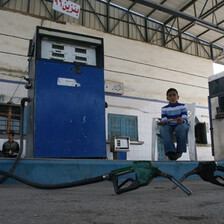Gaza Strip 7 January 2009
6 January 2009
I was outside trying to fix my car radio on a calm, sunny day around 11:30am. It was 27 December 2008. Suddenly there were loud booms overhead. Pillars of smoke began rising up in the sky.
The main thing I cared about at that moment were my four children, particularly, my two-year-old son Muhammad who always follows me around when I am off work on weekends.
I picked up my cell phone and began calling contacts to figure out what was going on. Then I made sure my kids were okay inside our home and drove towards Gaza City. It was complete destruction. In a course of a few seconds, scores of targets, including municipal buildings, police stations and charities were completely leveled to the ground.
Soon, Israel announced it was targeting the “Hamas infrastructure” and homemade rockets launchers. But most of those killed were civilians including women and children.
A mix of feelings has ripped through me since then, being a reporter, a father and a Palestinian refugee in Gaza.
The first thing I thought of was to stockpile some food for my children and then to ensure I had some gasoline for my car and my power generator. Gasoline, smuggled through underground tunnels on Egypt-Gaza border lines because of 19-month-long Israeli closure of Gaza, is sold at inflated prices.
As more Israeli attacks on Gaza spread from one area to another, the more I worried about my children. Muhammad, my son who heard the bombings for the first time ever, cried, “Baba, heyyyyyyyyyy,” the only word he uttered when he heard the first bombings.
Amidst such conditions, for the past few days, 10 relatives of mine — six of them children — have come to stay at my house. They feared that Israel would attack the area where they live.
Thankfully my wife is always understanding of my work pressure; she and my sweet children, Aseel, Nadine, Munir and even Muhammad have assured me a quiet atmosphere to work in. Munir, who is aged nine, always comes to my office telling me the latest news from the television.
As Israel’s attacks continue I am reporting under enormous pressure, dealing with the prolonged power outages, lack of gasoline to run my car and my small power generator, and broken recording equipment. But with the help of my friend and colleague from Free Speech Radio News, reporter Ghassan Bannoura in the West Bank, I have been able to continue filing my reports. Thank you Ghassan.
The most important thing that I need is to keep up, whatever pressure I am facing. I am a Palestinian in Gaza who lives the situation minute-by-minute. Israel has denied international reporters access into Gaza, so I need to do what I can to get information out.
Many of my own relatives are among the thousands who have fled to schools, run by UNRWA, the UN agency for Palestine refugees, because of continuous Israeli shelling of populated neighborhoods.
But as I am write this script, reports say Israeli shells killed dozens of civilians who were taking shelter at just such school in Jabaliya refugee camp in the north of the Gaza Strip. There are few places, if any, where we can truly be safe.
Today I can file, I can have my voice and the voices of others heard in the US. But who knows if these voices will still be heard tomorrow.
Rami Almeghari is contributor to The Electronic Intifada, IMEMC.org and Free Speech Radio News and is a part-time lecturer on media and political translation at the Islamic University of Gaza. Rami is also a former senior English translator at and editor-in-chief of the international press center of the Gaza-based Palestinian Information Service. He can be contacted at rami_almeghari A T hotmail D O T com. This article as adapted from a commentary broadcast on Free Speech Radio Network (http://www.fsrn.org).
Related Links





